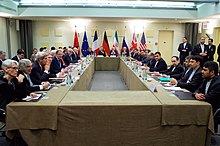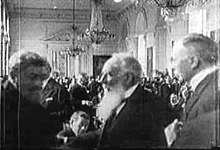
Back مفاوضات Arabic Danışıqlar Azerbaijani Negociació Catalan دانوستان CKB Vyjednávání Czech Forhandling Danish Verhandlung German Traktado Esperanto Negociación Spanish Läbirääkimised Estonian


| Alternative dispute resolution |
|---|
Negotiation is a dialogue between two or more parties to resolve points of difference, gain an advantage for an individual or collective, or craft outcomes to satisfy various interests. The parties aspire to agree on matters of mutual interest.[1] The agreement can be beneficial for all or some of the parties involved. The negotiators should establish their own needs and wants while also seeking to understand the wants and needs of others involved to increase their chances of closing deals, avoiding conflicts, forming relationships with other parties, or maximizing mutual gains.[1] Distributive negotiations, or compromises, are conducted by putting forward a position and making concessions to achieve an agreement. The degree to which the negotiating parties trust each other to implement the negotiated solution is a major factor in determining the success of a negotiation.
People negotiate daily, often without considering it a negotiation.[2][3] Negotiations may occur in organizations, including businesses, non-profits, and governments, as well as in sales and legal proceedings, and personal situations such as marriage, divorce, parenting, friendship, etc. Professional negotiators are often specialized. Examples of professional negotiators include union negotiators, leverage buyout negotiators, peace negotiators, and hostage negotiators. They may also work under other titles, such as diplomats, legislators, or arbitrators. Negotiations may also be conducted by algorithms or machines in what is known as automated negotiation.[4][1][5] In automated negotiation, the participants and process have to be modeled correctly.[6] Recent negotiation embraces complexity.[7]
- ^ a b c Adnan, Muhamad Hariz Muhamad; Hassan, Mohd Fadzil; Aziz, Izzatdin; Paputungan, Irving V (August 2016). "Protocols for agent-based autonomous negotiations: A review". 2016 3rd International Conference on Computer and Information Sciences (ICCOINS). Kuala Lumpur, Malaysia: IEEE. pp. 622–626. doi:10.1109/ICCOINS.2016.7783287. ISBN 978-1-5090-2549-7. S2CID 11379608.
- ^ de Felice, Fortune Barthélémy (1976). "The 50%Solution". In Zartman, I William (ed.). Negotiation, or the art of Negotiating. United States: Doubleday Anchor. p. 549.
- ^ Fisher, Roger; Ury, William (1984). Patton, Bruce (ed.). Getting to yes : negotiating agreement without giving in (Reprint ed.). New York: Penguin Books. ISBN 978-0140065343.
- ^ Adnan, Muhamad Hariz; Hassan, Mohd Fadzil; Aziz, Izzatdin Abdul; Rashid, Nuraini Abdul (2019), Saeed, Faisal; Gazem, Nadhmi; Mohammed, Fathey; Busalim, Abdelsalam (eds.), "A Survey and Future Vision of Double Auctions-Based Autonomous Cloud Service Negotiations", Recent Trends in Data Science and Soft Computing, vol. 843, Springer International Publishing, pp. 488–498, doi:10.1007/978-3-319-99007-1_46, ISBN 978-3-319-99006-4, S2CID 169093081
- ^ Adnan, Muhamad Hariz; Hassan, Mohd Fadzil; Aziz, Izzatdin Abd (October 2018). "Business Level Objectives of Customer for Autonomous Cloud Service Negotiation". Advanced Science Letters. 24 (10): 7524–7528. doi:10.1166/asl.2018.12971. S2CID 116247733.
- ^ Hargreaves, Brendan; Hult, Henrik; Reda, Sherief (January 2008). "Within-die process variations: How accurately can they be statistically modeled?". 2008 Asia and South Pacific Design Automation Conference. IEEE. pp. 524–530. doi:10.1109/aspdac.2008.4484007. ISBN 978-1-4244-1921-0. S2CID 12874929.
- ^ Embracing Complexity: A Review of Negotiation Research, Erica J. Boothby, Gus Cooney, Maurice E. Schweitzer, Annual Review of Psychology, Volume 74, 2023, pp 299–332, 2023–01
© MMXXIII Rich X Search. We shall prevail. All rights reserved. Rich X Search